
Journal of Indian Geophysical Union
Scope & Guideline
Connecting Minds, Unraveling Earth's Secrets
Introduction
Aims and Scopes
- Geophysical Research and Techniques:
The journal publishes studies utilizing various geophysical methods, including seismic, magnetic, and gravity surveys, to investigate subsurface structures, mineral resources, and geological formations. - Hydrological and Water Resource Management:
Research on groundwater dynamics, hydrological modeling, and the effects of anthropogenic activities on water resources is a significant focus, aiming to address water scarcity and sustainability issues in India. - Climate Change and Meteorological Studies:
The journal features research related to climate variability, monsoon prediction, and the impacts of climate change on regional weather patterns, contributing to the understanding of climate-related challenges. - Natural Hazards and Disaster Management:
Studies addressing the prediction, impact assessment, and management of natural hazards such as earthquakes, cyclones, and tsunamis are prominent, reflecting the journal's commitment to disaster preparedness and risk reduction. - Geochemical and Petrological Studies:
The journal includes research on the petrology and geochemistry of various rock types and minerals, enhancing the understanding of their formation processes and potential economic significance.
Trending and Emerging
- Integrated Approaches to Resource Management:
There is a growing trend towards interdisciplinary studies that integrate geophysical, hydrological, and environmental sciences to address complex resource management issues, particularly in water-scarce regions. - Climate Change Impact Studies:
Research focusing on the effects of climate change on hydrology, weather patterns, and ecosystem dynamics is gaining prominence, emphasizing the urgency of understanding these impacts in the Indian context. - Advanced Computational Modeling:
The use of sophisticated modeling techniques, including machine learning and numerical simulations, is on the rise, facilitating better predictions and analyses of geophysical phenomena. - Urban Geophysics and Environmental Monitoring:
Emerging themes in urban geophysics, focusing on pollution monitoring, groundwater quality, and urban heat islands, reflect the increasing need to address environmental challenges in rapidly urbanizing areas. - Sustainable Development Goals (SDGs) Alignment:
Research that aligns with the United Nations Sustainable Development Goals, particularly in relation to clean water, climate action, and sustainable resource management, is becoming increasingly significant in the journal's publications.
Declining or Waning
- Traditional Geological Mapping Techniques:
There appears to be a decreasing emphasis on conventional geological mapping and characterization methods, likely due to the rise of advanced geophysical and geospatial techniques that offer more detailed insights. - General Environmental Studies:
While environmental studies remain important, there seems to be a waning focus on broad environmental assessments without specific geophysical or geological applications, as research becomes more specialized. - Historical Geology and Paleontology:
Research themes related to historical geology and paleontological studies have become less frequent, possibly overshadowed by contemporary issues such as climate change and resource management.
Similar Journals

SURVEYS IN GEOPHYSICS
Leading the Charge in Geophysics and Geochemistry ResearchSURVEYS IN GEOPHYSICS is a leading academic journal published by SPRINGER that has been at the forefront of advancing the field of geophysics and geochemistry since its inception in 1986. With an impressive impact factor and consistently ranked in the top quartile (Q1) of its categories—Geochemistry and Petrology, and Geophysics—this journal represents a vital resource for researchers and professionals alike. The journal is indexed in Scopus, where it ranks among the top ten in both Earth and Planetary Sciences sectors, reflecting its high citation rates and significant contributions to the field. Although not an open access journal, SURVEYS IN GEOPHYSICS provides invaluable insights into contemporary research trends and methodologies, fostering a deeper understanding of the physical processes that shape our planet. The journal welcomes original research articles, comprehensive reviews, and surveys that significantly contribute to our knowledge of geophysical phenomena and are dedicated to supporting the academic community through rigorous peer review and publication. Located in the Netherlands, SURVEYS IN GEOPHYSICS continues to establish itself as an essential platform for scholarly exchange and innovative ideas.
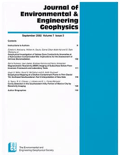
JOURNAL OF ENVIRONMENTAL AND ENGINEERING GEOPHYSICS
Unveiling the Secrets Beneath: Engineering and Environmental SynergyJOURNAL OF ENVIRONMENTAL AND ENGINEERING GEOPHYSICS, published by the ENVIRONMENTAL ENGINEERING GEOPHYSICAL SOC, serves as an essential platform for the dissemination of cutting-edge research in the interconnected fields of environmental engineering, geophysics, and geotechnical engineering. This journal, with the ISSN 1083-1363 and E-ISSN 1943-2658, boasts a solid reputation, reflected in its Q3 rankings in several categories as of 2023. As it converged from 2001 to 2024, the journal has evolved to meet the increasing demand for innovative solutions to contemporary environmental challenges. Researchers are encouraged to submit original articles that contribute meaningfully to our understanding of the subsurface environment and its engineering implications. The journal is indexed in Scopus, with commendable rankings including 72nd out of 165 in Geophysics, highlighting its role in advancing knowledge and application in Earth and Planetary Sciences. Although not an open access journal, subscribers and institutions alike recognize the value of its rigorous peer-reviewed content, ensuring that professionals and scholars are equipped with the latest findings and methodologies in this dynamic field.
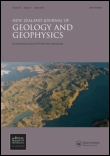
NEW ZEALAND JOURNAL OF GEOLOGY AND GEOPHYSICS
Advancing Knowledge in Geology and Geophysics.NEW ZEALAND JOURNAL OF GEOLOGY AND GEOPHYSICS, published by Taylor & Francis Ltd, stands as a prominent forum dedicated to the interdisciplinary exploration of geological and geophysical phenomena. With an impact factor that situates this journal in the prestigious Q1 category across key subjects—namely Earth and Planetary Sciences, Geology, and Geophysics—it is a critical resource for researchers, professionals, and students alike. The journal has been operational since 1958 and continues to contribute valuable insights into the complexities of the Earth's processes. Although it does not currently offer Open Access options, its broad readership benefits from an extensive archive of high-quality research findings that span from 1958 to 2024. Located in the United Kingdom, the journal remains a pivotal player in advancing the understanding of Earth's systems, making significant contributions to both academic inquiry and practical applications in the field.
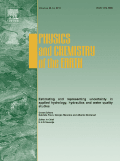
PHYSICS AND CHEMISTRY OF THE EARTH
Advancing Earth Science through Interdisciplinary InsightsThe Physics and Chemistry of the Earth is a premier interdisciplinary journal published by Pergamon-Elsevier Science Ltd, dedicated to advancing the understanding of Earth sciences through the integration of geophysical and geochemical perspectives. With an ISSN of 1474-7065 and an E-ISSN of 1873-5193, the journal serves as a critical platform for researchers and professionals to disseminate key findings and innovative methodologies in the realms of geophysics and petrology. As of 2023, it proudly holds a Q2 ranking in both Geochemistry and Petrology and Geophysics, reflecting its robust impact in the scientific community, with Scopus rankings that position it in the top 20% and 32% of its respective categories. Notably, the journal is available in an open-access format, allowing for greater dissemination and accessibility of research contributions. With a publication history spanning from 1992 to 2024, Physics and Chemistry of the Earth stands as a vital resource for ongoing research and discovery in the Earth sciences, making it an essential read for academics and practitioners alike.

Geofizika
Unlocking Earth’s Secrets Through Open AccessGeofizika, an esteemed journal published by the Andrija Mohorovičić Geophysical Institute at the University of Zagreb, presents a significant platform for research in the fields of geophysics and Earth sciences. With an Open Access model established since 1984, this journal ensures that scientific knowledge is accessible to a broad audience, encouraging collaborations and the free exchange of ideas. Geofizika has steadily evolved through its converging years from 1989 to 1999 and has been active from 2003 to the present, reflecting its commitment to advancing geophysical research. The journal has been recognized for its contributions to Earth and Planetary Sciences and has acquired respectable ranks in various categories; notably, it holds a Q4 status in Geophysics as of 2023. Researchers, professionals, and students will find Geofizika a valuable resource for the latest discoveries and methodologies in geophysics, supporting the academic community in expanding the frontiers of knowledge in these vital scientific domains.

Geofisica Internacional
Elevating Research Standards in Geophysics Since 1975Geofisica Internacional, an esteemed academic journal published by the Instituto de Geofísica at UNAM, Mexico's prestigious National Autonomous University, has been a pivotal platform for advancing the field of geophysics and energy studies since its inception in 1975. This Open Access journal aims to disseminate high-quality research findings, making significant contributions to our understanding of Earth's processes and energy resources. With a current impact factor that situates it in the Q3 category for both Energy (miscellaneous) and Geophysics, it provides a continuous dialogue for researchers, professionals, and students interested in the intersection of these critical areas. Based in Mexico City and publishing articles that span various geophysical disciplines, Geofisica Internacional is indispensable for anyone seeking to stay at the forefront of environmental and energy research.
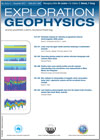
Exploration Geophysics
Fostering Collaboration in Earth Sciences for a Better TomorrowExploration Geophysics is a prestigious journal published by Taylor & Francis Ltd., prominently focusing on the interdisciplinary fields of geology and geophysics. Established in 1970 and continuing its legacy to 2024, this journal serves as a vital platform for researchers, professionals, and students alike, disseminating cutting-edge research and innovative methodologies in earth sciences. With a robust impact factor that highlights its academic influence, and classified in the Q3 category for both geology and geophysics, it ranks among the notable publications in the field, placing it in the 51st and 50th percentiles of its respective categories. Although available through standard subscription access, the journal encourages engagement from a diverse readership aimed at exploring the intricacies of earth processes, resource exploration, and environmental evaluations. By contributing valuable insights and fostering collaborations, Exploration Geophysics continues to play a crucial role in advancing the understanding of our planet's subsurface dynamics.

Geology Geophysics and Environment
Advancing Knowledge in Geology, Geophysics, and Environment.Geology Geophysics and Environment, published by AGH University of Science & Technology Press, is a prominent, open-access journal that has been disseminating knowledge since its inception in 2012. With its ISSN 2299-8004 and E-ISSN 2353-0790, this scholarly journal serves as a vital platform for researchers, professionals, and students interested in the interdisciplinary fields of geology, geophysics, and environmental science. By providing unrestricted access to a wide array of high-quality research articles, Geology Geophysics and Environment facilitates the sharing of innovative ideas and advancements that address some of the most pressing challenges in earth sciences today. Recognized for its contributions to the field, this journal is crucial for anyone looking to stay abreast of the latest trends and discoveries in the dynamic landscapes of geology and environmental research.

Solid Earth
Exploring the Depths of Geological KnowledgeSolid Earth is a prestigious open-access journal published by COPERNICUS GESELLSCHAFT MBH, dedicated to advancing the understanding of geological and environmental sciences. With an ISSN of 1869-9510 and E-ISSN 1869-9529, this journal has been at the forefront of the Earth sciences since it became fully open access in 2010. Based in Göttingen, Germany, it features a rich array of interdisciplinary research relevant to earth-surface processes, geochemistry, paleontology, and geophysics, among other fields. The significance of Solid Earth is underscored by its rankings in the Q1 category across multiple related disciplines, demonstrating a strong impact factor within the community. As of 2023, it stands out with an impressive Scopus ranking, pushing the boundaries of knowledge and research excellence. By providing a platform for high-quality scientific contributions, Solid Earth is essential for researchers, professionals, and students looking to explore and disseminate impactful findings in the pursuit of sustainable earth science advancements.
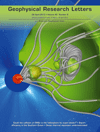
GEOPHYSICAL RESEARCH LETTERS
Shaping the Future of Earth Sciences Through Research.GEOPHYSICAL RESEARCH LETTERS is a renowned academic journal published by the American Geophysical Union that plays a pivotal role in advancing the field of Earth and Planetary Sciences. Established in 1974, this esteemed journal provides a platform for the latest research and innovations in geophysics, including but not limited to, solid earth, atmospheric sciences, and oceanography. With its impressive ranking of #7 out of 165 in Geophysics and #13 out of 195 in General Earth and Planetary Sciences according to Scopus, and being categorized in the Q1 quartile for both fields in 2023, it is a leading choice for academic and professional researchers alike. While GEOPHYSICAL RESEARCH LETTERS does not currently offer open access, it remains committed to disseminating high-quality, peer-reviewed scientific literature. With ongoing contributions expected through to 2024, this journal is essential for those who seek to deepen their understanding and engage with cutting-edge developments in geophysical research. Its influence and reach underscore its significance in shaping the future of geophysical inquiry.